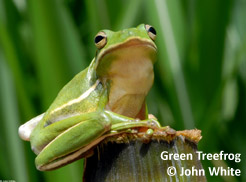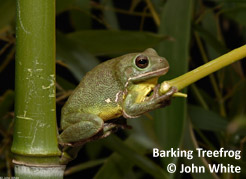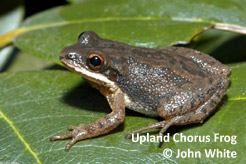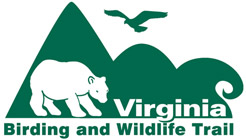
Whether it’s a Green Treefrog stuck to your kitchen window on a warm, rainy summer night or a lively chorus of Spring Peepers announcing the coming of spring, we have all either seen or heard one of Virginia’s twenty eight species of frogs (and toads). But did you know that frogs are considered by many conservationists to be the most imperiled group of animals in the world? Almost of fifty precent of the world’s frog species are imperiled. Some have even gone extinct in the past couple of decades. The causes of these disappearances have been primarily associated with habitat loss and disease, specifically the deadly fungus commonly known as “chytrid.”
Frogs are important natural resources that deserve our attention. Because of their aquatic and terrestrial life stages, frogs are excellent indicators of environmental health and water quality. Frogs also provide a free pest control service by consuming countless numbers of insects every year; in turn, they are food for a variety of other animals.
Acknowledging the importance of frogs and the concern over their decline, the Virginia Department of Wildlife Resources has been working in partnership with the North American Amphibian Monitoring Program (NAAMP), Virginia Living Museum and citizen biologists to monitor trends in frog populations across the Commonwealth. We have also been restoring wetlands and acquiring new lands for wildlife conservation.

But we still need your help. Please visit the resources below to learn more about these fascinating animals and what you can do to protect them. If you’re an educator, please visit our our Teacher’s Corner for ideas on frog-related lesson plans and activities.
More about Virginia’s Frogs
- Order A Guide to the Frogs and Toads of Virginia
- Virginia Frog Species Information
- Virginia Frog Phenology (Calling/ Breeding Periods) (PDF)
- Virginia Herpetological Society
- Test your frog call identification skills!
- Frog and Toad Coloring Pages (PDF)
Get Involved in Frog Conservation

- Volunteer for the Virginia Frog and Toad Calling Survey
- Volunteer for FrogWatch USA
- Providing Water in Your Habitat at Home
- Backyard Guide to Helping Amphibians and Reptiles
- Rain Gardens: A Technical Guide
- Homeowner’s Guide to Protecting Frogs – Lawn & Garden Care (PDF)
- A Guide to Creating Vernal Ponds
- Habitat Management Guidelines for Amphibians and Reptiles of the Northeastern United States – a guide for landowners and land managers, available from NEPARC
 Where to Observe Frogs
Where to Observe Frogs
Looking for frogs is a fun activity that the whole family can enjoy and a great way to test your frog call ID skills! The Virginia Birding and Wildlife Trail offers locations throughout the state where frogs may be seen and heard. Visit our VBWT webpage to find a site near you!
Other Amphibian-Related Resources

